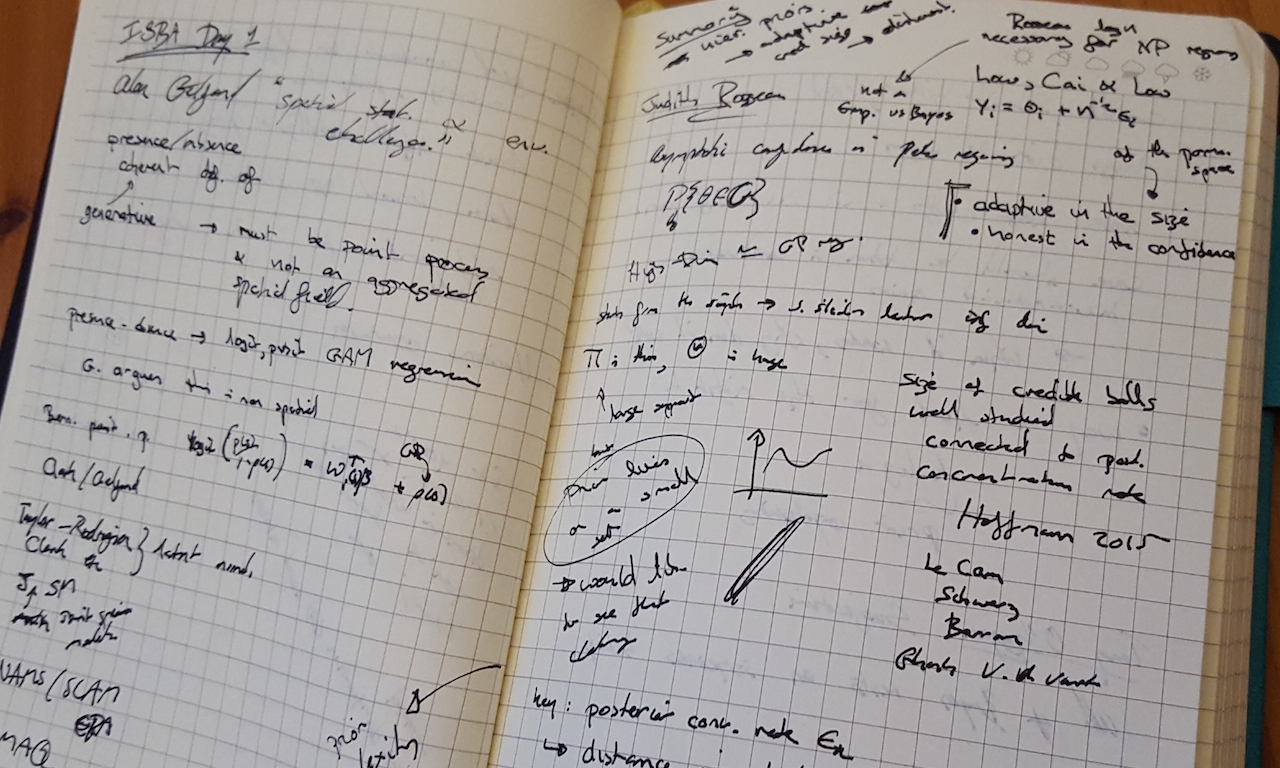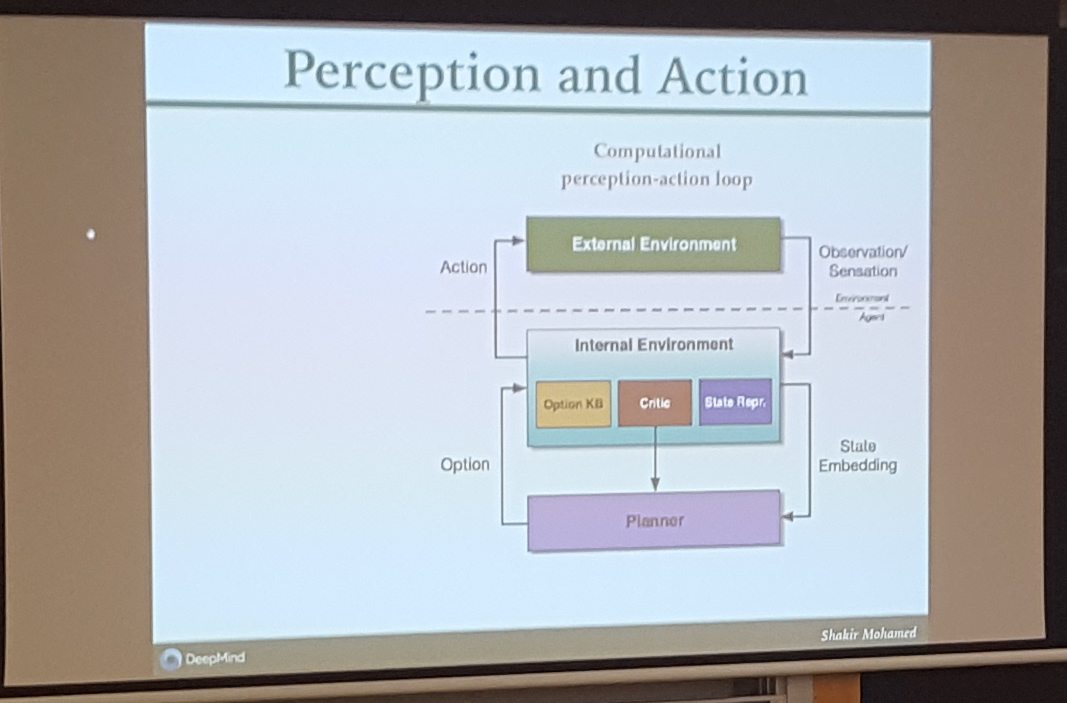Here are few scattered thoughts of mine from the 2018 meeting of the International Society for Bayesian Analysis
Foundation Lectures

The conference began in brilliant sunshine and no doubt game many attendees a wildly unrealistic impression of a Scottish summer. The first day was structured around the four ‘foundation lectures’, these were given by
- Alan Gel’fand who delivered a talk on point process data and effective ways to model it. The particular focus was on presence/absence model and constructing a coherent definition of a generative model for such scenarios. Similar concerns are expressed in the conditional independence assumptions of Cox processes - the key issue is then in how to structure hierarchical models of this type to have the right sort of ‘smoothness’.
- Judith Rosseau gave a talk on Bayesian asymptotics for nonparameteric models which not having done much in the way of asymptotics I’m not sure I should have found as engaging as I did, but she delivered a complex subject matter in a way that was engaging and enthusiastic and made me curious to learn more about the field - surely an important part of any foundation lecture!
- Tony O’Hagan presented a vigorous warning to all young Bayesians to stay away from objective Bayes. Given there was little/no riposte from the O’Bayes community in the questions following perhaps that war is won? Or perhaps more likely an unwillingness to engage and a desire to quietly keep on doing the maths, publishing the papers and avoiding the philosophy. His talk included the following advice for young Bayesians
An appeal
When I was teaching undergraduates I hated to see so many go off into finance
- Often the very best students
- I would try to persuade them to put their talents to better use
I say the same to the many young Bayesians in this audience
- Don’t do “objetive” Bayes
- Yes, it means you can do pretty mathematic and get papers
- But it’s the same sort of ad hockery as the frequentists
- What’s the value? It’s not science
So please use your talents to be proper Bayesians
- Tackle the hard problems about formulating knowledge and beliefs carefully and scientifically.
Tony O'Hagan
- Ed George stressed from the off he wanted to present an application and he certainly delivered what I would hold up as a wonderful example good statistics done well - a careful process of hypothesis forming, model building, and analysis on the relationship between hospital patient volume and patient mortality. An example of a statistical processes that has perhaps gone out of fashion with the current popularity of ‘deep learning’ or other suitable buzzwords, at the same time he mentioned this work took 2 years to do followed by 6 months validation, unfortunately an inconceivable timeframe for industry, but I like to think there is a happy middle ground and an important place for this type of statistics - tuning network topologies just does not have the interperability of generalised linear models and other classical statistical methods.

Poster Sessions
My first experience of presenting work in poster form and despite a slightly stressful reworking of my poster to rotate it from landscape to portrait after noticing the boards going up it was overall a positive experience. It can be somewhat daunting having your work on display in this passive form, and I’m not at all sure how artists manage, but it definitely very worth doing. Of course you (hopefully) get questions and input from the superstars of your field and while I stuttered and stammered my way through their questions at the time when the dust settled over the next couple of days I was able to take a lot from some particularly insightful questions, this was incredibly helpful as a guide to my own thinking regarding points to emphasise in my current work as well as some future directions. However it is not just the input of the senior academics, but also the input of peers at your own level and especially those who have no prior exposure or knowledge of your little corner of the wider field. Some of the questions really made me reevaluate what it was reasonable to expect people to already be familiar with and I used that to significantly rework my talk for the following weeks BAYSM conference.
Selected Others
 Too many to mention but amongst the other talks I would particularly mention Michael Jordan who gave a very interesting talk about their attempts to speed up stochastic gradient matching methods using symplectic integrators, geometric numerical integrators have a very rich theory and it is exciting to see what they can offer to the fields of statistics and machine learning. I was also very much anticipating the opportunity to hear Professor Dawid deliver the De Finetti lecture. Information/Decision geometry is something that continues to hold his attention and focus and I think it is an area that continues to be important, even though arguably the successes of information geometry have been modest the focus of Prof. Dawid on the decision theoretic aspects strike me as being of particular importance. There is something very philosophically Cartesian about the way decision theory is framed (I plan to expand on this in a future blog post) and this was also evident in a talk given by Shakir Mohammed from Google DeepMind who described his ‘Bayesian Agent’ and I’ve attached a somewhat blurry picture of a relevant slide - this assumption of a little Bayesian homunculus inside the decision making apparatus is something that I wonder if many philosophers of cognitive science would question and it would be great to see how the ‘sense-plan-act’ structure of decision theory could be modified (if possible!) to examine smooth coping and online behaviour, i.e. those actions in which the subject/object distinction and the sequential sense-act-plan cycle does not seem to occur, or is at least questionable. So far ‘machine learners’ have been much bolder when it comes to talking about (artificial) intelligence, but perhaps statistics and in particularly decision theory as a building block to inference has much more to say here.
Too many to mention but amongst the other talks I would particularly mention Michael Jordan who gave a very interesting talk about their attempts to speed up stochastic gradient matching methods using symplectic integrators, geometric numerical integrators have a very rich theory and it is exciting to see what they can offer to the fields of statistics and machine learning. I was also very much anticipating the opportunity to hear Professor Dawid deliver the De Finetti lecture. Information/Decision geometry is something that continues to hold his attention and focus and I think it is an area that continues to be important, even though arguably the successes of information geometry have been modest the focus of Prof. Dawid on the decision theoretic aspects strike me as being of particular importance. There is something very philosophically Cartesian about the way decision theory is framed (I plan to expand on this in a future blog post) and this was also evident in a talk given by Shakir Mohammed from Google DeepMind who described his ‘Bayesian Agent’ and I’ve attached a somewhat blurry picture of a relevant slide - this assumption of a little Bayesian homunculus inside the decision making apparatus is something that I wonder if many philosophers of cognitive science would question and it would be great to see how the ‘sense-plan-act’ structure of decision theory could be modified (if possible!) to examine smooth coping and online behaviour, i.e. those actions in which the subject/object distinction and the sequential sense-act-plan cycle does not seem to occur, or is at least questionable. So far ‘machine learners’ have been much bolder when it comes to talking about (artificial) intelligence, but perhaps statistics and in particularly decision theory as a building block to inference has much more to say here.
What I Learned
Conferences can be exhausting! More seriously
- Check beforehand what the expected poster dimension are!
- Condensing work to poster form is hard - but the act of presenting it is definitely worthwhile
- Don’t try go to everything, but make use of the opportunities, find your balance.
- Really do check expected poster dimensions… it just takes an email!